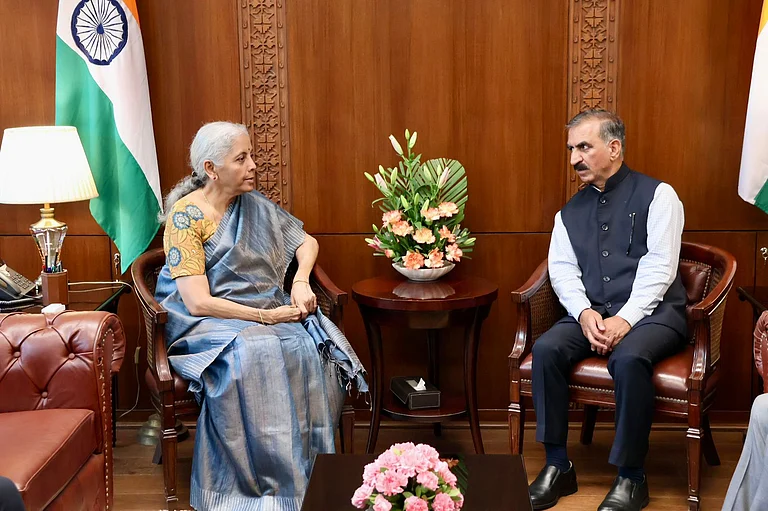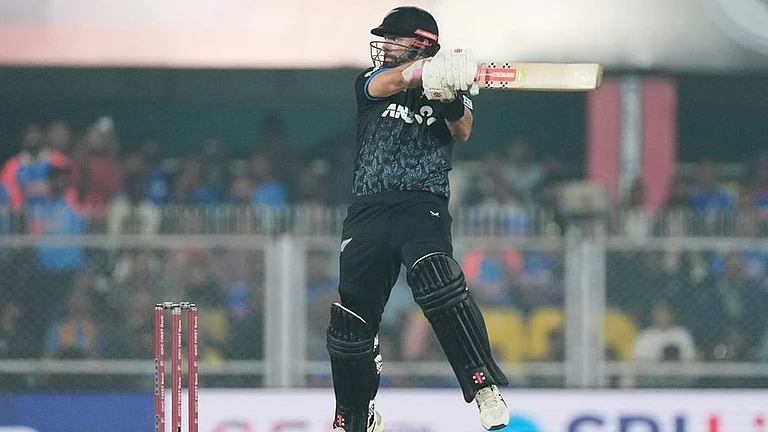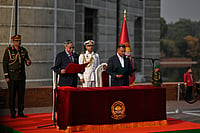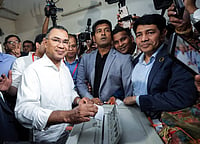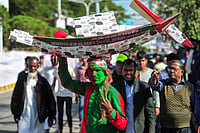On October 12, at the India Today news channel’s primetime show, ‘News Today’, anchored by well-known journalist Rajdeep Sardesai, UK-based Palestinian academician Makram Khoury-Machool described Hamas’ operational methods as a “military struggle” that was resorted to after “the world failed Palestinians” in the face of years of “Israeli atrocities”. Sardesai protested instantly. “Let us not justify terrorism. This is terrorism, sir!” he said, regarding Hamas’ October 7 attack on Israel. He then asked the question that has been thrown at every Palestinian representative appearing on mainstream TV news channels, especially those headquartered in the US and Europe. “Will you and others condemn the Hamas terror attack on Israel? Innocent civilians were killed in a barbaric fashion. Do you agree that the first step towards any kind of reconciliation is clear and outright condemnation of what is seen as terrorism of the worst kind?”
Sardesai has never used words like ‘‘terror’’, ‘‘crime’’, or ‘‘barbaric’’ about Israel’s role in Palestine in his shows. Even though he did mention “a lot of concerns about the nature of the Israeli offensive and what it means for civilians caught in the crossfire,” he never asked Israeli authorities to “condemn” Israel’s indiscriminate and relentless bombardment.
Sardesai is no exception. He represents the broad trends displayed by the mainstream media, especially those media houses located outside the Arab world. According to an editorial in The New Humanitarian, an independent non-profit news outlet headquartered in Switzerland, Amercian and British television outlets demanded the condemnation of Hamas from Palestinians as “a ticket of entry to the conversation.” US broadcast giant CNN’s shows have been replete with words like “savage” and “terrorist” reserved for Hamas, which they report launched a “brutal assault”, went on a “rampage” in Israel, “slaughtered” Israelis and carried out “massacres”. But the Israeli government’s military response has been spared such harsh words, referred to mostly as “retaliatory attacks” and “offensive actions”. An October 11 headline on CNN read: “Israel steps up Gaza offensive as brutality of Hamas attacks becomes evident.”
According to Pulitzer-winning New York Times (NYT) contributor Mona Chalabi’s analysis (with help from data compiled and analysed by Holly Jackson, a researcher at the University of California, Berkeley), the word “massacre” shows up 24 times in reference to Israelis and once in reference to Palestinians in NYT articles since October 7, 2023. “In addition to the bias in the sheer volume of coverage, there was a huge difference in the language used,” Chalabi wrote, adding that an analysis of 991 NYT articles posted between October 7 and 18 showed that the articles rarely mention the names of Palestinians who died—using terms like “mourner”, “resident”, “assailant” or “militant” instead.
“Language is very important,” UK-based Palestinian journalist Yara Eid told a presenter of the British broadcaster Sky News during a live show in late October. “Palestinians don’t just die, they get killed,” Eid pointed out. The presenter had announced in her October 21 show that 1,400 Israelis were “killed” when “Hamas first launched its attack on Israel”, following which, “Palestinian authorities say that over 4,000 Palestinians died in Gaza.”
This differential treatment has left both the world and newsrooms divided and polarised. Mainstream media houses, as a trend, have chosen to follow the policy of the governments where they are headquartered. Since most European countries and the US have stood by Israel, mainstream media houses based there have shown a visible pro-Israel bias.
On November 11, Canadian independent media, The Breach, published a report analysing the contents of ‘CTV National News’, the most-watched national news show in Canada. It said that the channel reported on Gaza “with anti-Palestinian double standards” and “featured disproportionately more Israeli voices than Palestinian ones in the last month.”
Taking Sides
The pro-Israeli bias in the mainstream media’s coverage has been called out by major media outlets based in West Asian countries as well as independent media outlets from different parts of the world, including Europe and the US. “Throughout the past week of horrors in Gaza and Israel, mainstream US news programs have made it painfully clear that, for them, Palestinians are expendable,” American magazine The Nation’s acting senior editor Jack Mirkinson wrote in an article in November.
In October, at the BBC’s ‘Newsnight’ show, host Kirsty Wark had asked Husam Zomlot, the head of the Palestinian Mission to the UK, about the family members he lost in Gaza. Zomlot described how his cousin, her husband, two children, mother-in-law, and two other relatives were killed on the spot in an Israeli bombing on their house. His two-year-old twin sons were in intensive care at the local hospital. “This is truly heartbreaking and the issue here is that they have no bankers, no Iron Dome, they have nowhere to go. They are simply sitting ducks before the Israeli war machine,” Zomlot said.
No sooner had he finished than Wark asked, “I’m sorry for your personal loss, but can I be clear though, you cannot condone the killing of civilians in Israel, can you?”

Zomlot, like most other Palestinians facing this question, asked why the media never invites Israelis when Palestinians are killed throughout the year and asks for condemnations from them.
The general tendency has been to identify Hamas’ October 7 attack on Israel as the starting point of the ongoing conflict, keeping the Israeli occupation that has been relentlessly going on for years out of the discussions. Using different sets of words for the two sides doubles the impact of such a biased portrayal.
Yara Eid has questioned the way the western media describes the ongoing conflict as the “Israel-Hamas war”, arguing that the description is misleading. “Such a description posits that Israel is an equal power (to Hamas), but Israel is an occupying power,” she said, pointing out that Palestinians have been “subjected to ethnic cleansing and genocide through the last 75 years.” This fact is being overlooked by the western media. “This is not really a war against Hamas…Many Israeli spokespersons went on TV and said this is a war against Palestinians in Gaza,” Eid said.
Chalabi, during the Pulitzer award ceremony in mid-November, objected to the description as well. “I think it’s the ‘Israel-Palestine war.’ And no one in this room is willing to mention the ‘P-word,’ and I think it’s really important,” she said.
They may well be right in challenging the description of the conflict as the Israel-Hamas war, as Israel’s attacks have not remained limited to Hamas-controlled Gaza but also to the West Bank, where Hamas has no presence.
According to the UN agency, Office for the Coordination of Human Affairs (OCHA), as many as 221 Palestinians, including 56 children, were killed by Israeli forces and settlers in the West Bank between October 7 and November 25. The death toll is double this figure when the whole of 2023 is counted. But, as Chalebi pointed out, the NYT’s coverage of Israeli deaths was increasing at a time when more Palestinians were dying.
Historical Bias
The role the western mainstream media is playing is not a surprising one. In a May 2021 article published in Columbia Journalism Review, its public editor Ariana Pekary described how, during the 2021 Israel-Palestine conflict, CNN aired a two-hour special on the brewing crisis without explaining why it was happening—the trigger was Israel’s alleged eviction initiatives in Palestine. “Almost every guest was located in Israel; the network didn’t feature a single person in a Palestinian territory or neighborhood. There were no questions about the recent Palestinian evictions or actions by Israeli police that instigated Hamas retaliation,” Pekary wrote. She pointed out that star presenter Jake Tapper’s show allotted half the time to a correspondent in Jerusalem and the other half to the then-Israeli ambassador to the US, who discussed the fear he felt for his parents living in Israel. No one represented the Palestinian perspective.
This year’s coverage is no different, a look at Tapper’s shows, among others, reveals.
Allegations of the NYT’s pro-Israel bias are decades old. In 2021, when Jackson was at the Massachusetts Institute of Technology (MIT), she published a paper titled ‘The New York Times Distorts the Palestinian Struggle’. It analysed over 33,000 NYT articles during the First and Second Palestinian intifadas (civil uprisings during 1987-93 and 2000-05). The study revealed that “anti-Palestinian bias persisted disproportionately…during both periods.”
The paper spoke of “clear patterns of bias against Palestinians” through two main linguistic features: (1) a disproportionate use of the passive voice to refer to negative or violent action perpetrated towards Palestinians and (2) the use of more negative and violent rhetoric in reference to Palestinians compared to Israelis.
Things remain the same for the NYT and other western media majors as well.
In a November 22 article titled ‘Analysis: How the UK and US Media Dehumanise Palestinians’, investigative journalists Claire Lauterbach and Namir Shabibi pointed out that the first mention of Palestinian deaths in the UK’s The Times’ headlines appeared 11 days after Hamas’ assault. By then it had run several front page pieces about specific, named Israeli victims, including an in-depth profile (with portrait) of a kibbutz family killed by the Hamas-led offensive. “Unsurprisingly, on 12 October, the Telegraph published the number of Israelis killed in factors of ‘9/11s’ in a striking infographic which didn’t even bother to include an estimate of Palestinian deaths,” they wrote.
This pro-Israeli bias has been reflected in various ways—from fact-checking and portrayals of the war victims to policy analysis and presentation.
In the last week of October, Canadian-American media Vice, republished an edited version of a 2021 interview with Palestinian-Armenian-Egyptian artist, creative director and professor Kegham Djeghalian Jr, on the works of his grandfather, Kegham Djeghalian Senior who is often referred to as ‘‘Gaza’s first photographer’’. Djeghalian Jr and the interviewer, Palestinian journalist Dana Al Sheikh, alleged that the interview had been distorted before being republished.
Speaking to the Egypt-based news portal CairoScene, they alleged that terms like ‘‘Israeli Occupation’’ ‘‘Nakba’’ (catastrophe; referring to the 1948 displacement of Palestinians) and ‘‘Naksha’’ (setback; referring to the beginning of Israeli occupation in 1967) had been removed from the interview, while a context of ‘‘Hamas takes power,’’ which was not part of the original interview, had been introduced.
The original interview had no reference to Hamas, both Djeghalian and Al Sheikh alleged.
“What is implied is that Hamas is the cause of the decline and tragedy of Gaza. Historically, this is absolutely inaccurate,” they wrote in a joint email to Vice’s Editor-in-Chief, which they shared with CairoScene. Vice did not respond to their emails, they said.








